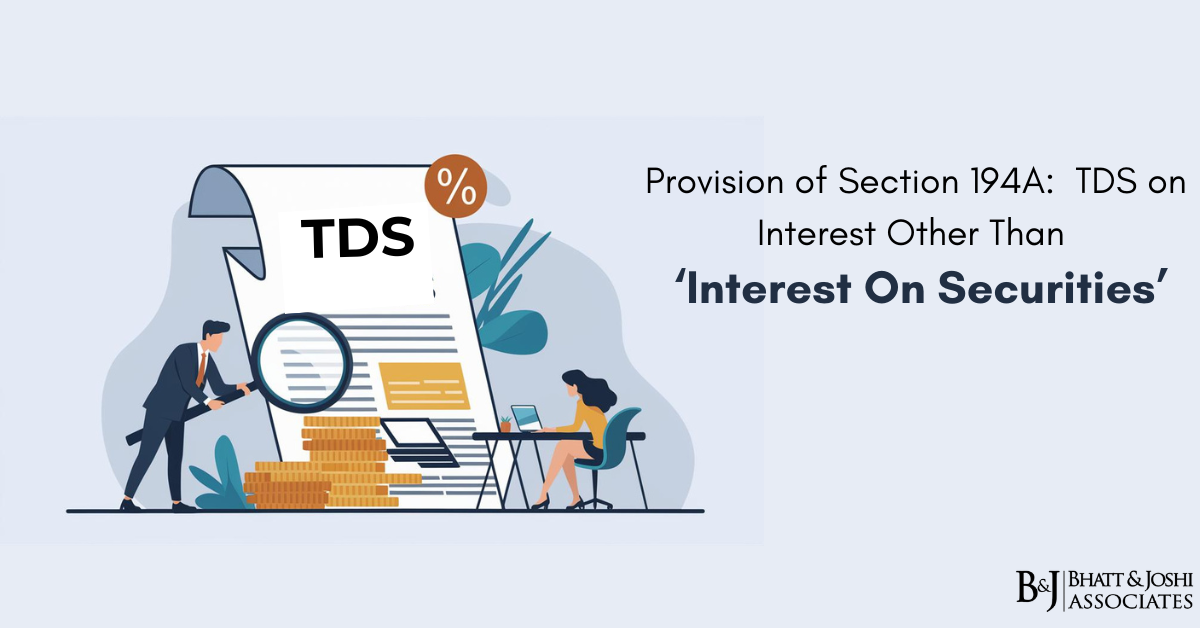Section 194A: TDS on Interest Other Than ‘Interest On Securities’
Introduction
The Indian Income Tax Act, of 1961, incorporates various provisions to regulate and streamline tax deductions at source (TDS). Section 194A specifically deals with TDS on interest other than interest on securities. This article aims to provide a comprehensive overview of Section 194A, detailing the provisions, responsibilities, exemptions, and procedural aspects associated with TDS on such interest payments.
Scope and Applicability
Responsible Entities
Under Section 194A, any person other than an individual or Hindu Undivided Family (HUF) responsible for making payments of interest, other than interest on securities, to a resident person must deduct tax at source. This provision encompasses entities such as partnership firms, companies, trusts, and others. However, individuals and HUFs are also liable to deduct tax under specific conditions. Effective from April 1, 2020, if the turnover or sales of a business exceed Rs. 1 crore or the gross receipts of a profession exceed Rs. 50 lakhs in the preceding financial year, then such individuals and HUFs must also comply with this TDS provision.
TDS Rate
The rate of TDS under Section 194A is 10%. It is important to note that neither surcharge nor education cess applies to this deduction. In cases where the recipient fails to provide their Permanent Account Number (PAN), the rate of TDS increases to 20%. This penalty aims to enforce compliance and ensure proper documentation of taxpayers.
Exemptions from TDS
Section 194A outlines several scenarios where tax is not to be deducted on interest payments. These exemptions aim to ease the administrative burden on entities making small or specific types of interest payments.
Interest Below Threshold Limits
- If the interest amount is less than Rs. 5,000 in a financial year, TDS is not required.
- For senior citizens, the threshold is higher. Interest payments up to Rs. 50,000 from banks, cooperative societies, or post offices are exempt from TDS. For other payers, the exemption limit is Rs. 40,000.
Specific Exemptions
- Banks and Financial Institutions: Interest payments to banks, financial corporations, Life Insurance Corporation (LIC), Unit Trust of India (UTI), and any other institutions recognized by the Central Government are exempt from TDS.
- Firm-Partner Transactions: Interest credited by a firm to its partners is not subject to TDS.
- Cooperative Societies: Interest paid by cooperative societies to their members is exempt.
- Central Government Schemes: Interest payments under any scheme notified by the Central Government in the Official Gazette are exempt.
- Compensation under Motor Vehicle Act: Interest received as compensation under the Motor Vehicle Act, not exceeding Rs. 50,000, is exempt.
- Zero Coupon Bonds: Income from zero coupon bonds issued by Infrastructure Capital Companies is also exempt.
Special Cases
Co-operative Societies
Effective April 1, 2020, if the turnover of a cooperative society exceeds Rs. 50 crore in the preceding financial year, and it pays interest exceeding Rs. 40,000 (Rs. 50,000 for senior citizens), then TDS must be deducted.
Educational and Religious Institutions
According to Circular No. F 12/113/68 IT (A-11) dated October 28, 1968, income of educational institutions exempt under Section 10(23C) and religious trusts exempt under Section 11 do not require TDS on interest payments. However, religious trusts must obtain an exemption certificate under Section 197A from the income tax officer.
Finance Companies and NBFCs
Interest payments on loans taken from finance companies or non-banking financial companies (NBFCs) are subject to TDS.
Land Acquisition Act
Interest payments made under the Land Acquisition Act are subject to TDS.
Insurance Companies
If an insurance company delays in issuing a claim, interest paid on the delayed payment after deducting tax is subject to TDS.
Practical Considerations
Minor Accounts and TDS
Under Section 64(1A) of the Income Tax Act, the income of a minor child is clubbed with the income of the parent whose income is higher. However, TDS is deducted individually on the interest credited to the minor’s account, even if the deposits of the minor, father, and mother are with the same bank.
Renewal of Bank Deposits
When a depositor renews a deposit along with the accrued interest, TDS is applicable on the interest amount, irrespective of whether it is withdrawn or reinvested.
Adjustments and Corrections
If excess TDS is deducted by mistake, adjustments can be made in the same financial year. This allows entities to correct over-deductions and avoid complications in subsequent years.
Lower or No TDS Deduction
Taxpayers whose total income is below the taxable limit can apply for a certificate of lower or no deduction of TDS in Form No. 13. The income tax officer issues this certificate under Section 197(1), allowing the payer to deduct TDS at a lower rate or not at all.
Procedural Aspects
Deduction and Deposit of TDS
TDS must be deducted either on the date of payment or the date of credit in the account, whichever is earlier. The deducted tax should be deposited with the government within the specified timelines to avoid penalties and interest.
Issuance of TDS Certificates
Entities responsible for deducting TDS must issue a TDS certificate (Form 16A) to the recipient, detailing the amount of interest paid and TDS deducted. This certificate is crucial for recipients to claim credit for the TDS deducted.
Filing of TDS Returns
Entities must file quarterly TDS returns (Form 26Q) detailing the interest payments and TDS deductions. Accurate and timely filing ensures compliance and avoids penalties.
Record Keeping
Maintaining proper records of interest payments, TDS deductions, and related documentation is essential for compliance and audit purposes. Entities should ensure that records are updated and readily available for inspection by tax authorities.
Conclusion
Understanding the provisions of TDS under Section 194A is crucial for entities making interest payments to ensure compliance with tax regulations. This detailed analysis highlights the complexities of TDS on interest other than securities, providing clarity on rates, exemptions, responsibilities, and procedural aspects. By adhering to these provisions, entities can avoid penalties and ensure smooth tax compliance.
 Whatsapp
Whatsapp


